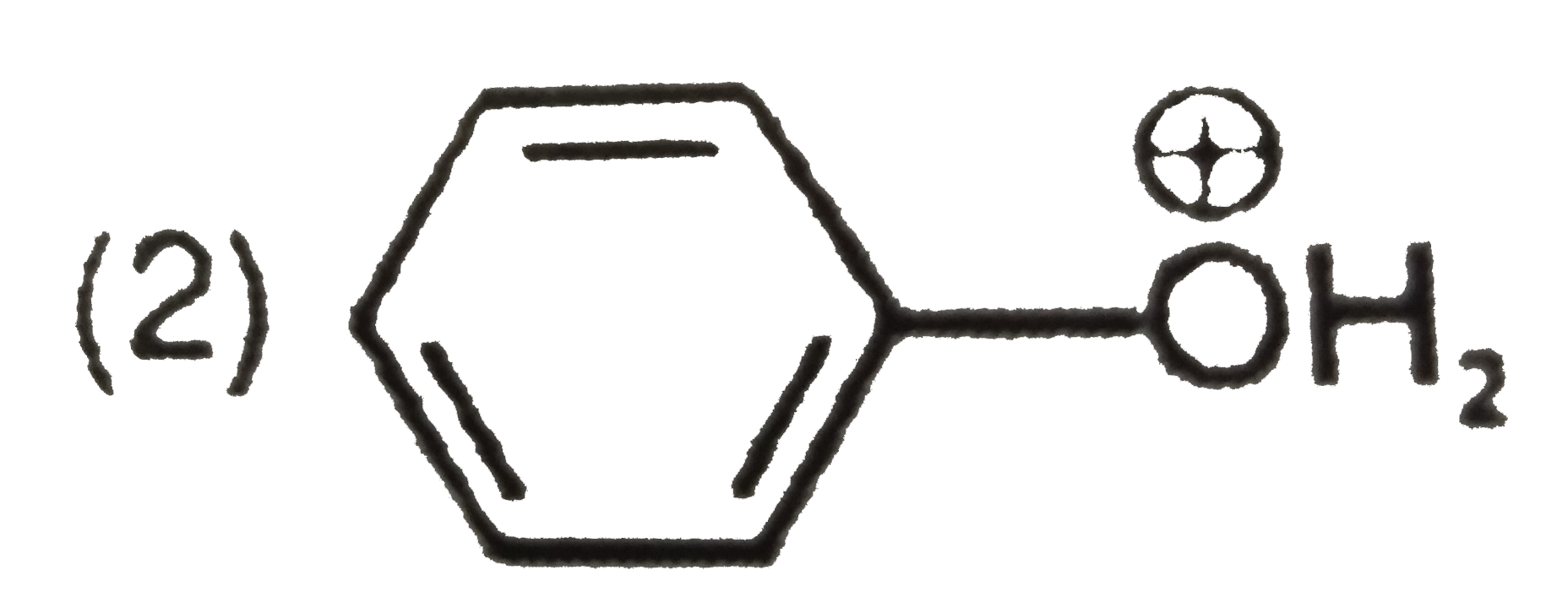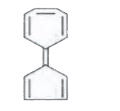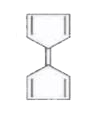Resonance stabilized cation is:




The correct Answer is:C
To determine which cation is resonance stabilized, we need to analyze the given options based on the concept of resonance, which involves the delocalization of pi electrons. Here’s a step-by-step solution:
Step 1: Understand Resonance
Resonance occurs when electrons can be delocalized across multiple atoms, allowing for different structural representations (resonance structures) of the same molecule. This delocalization stabilizes the molecule.
Step 2: Analyze Each Option
We will analyze each option to see if the cation can be resonance stabilized.
Option A: Cation with Nitrogen and Benzene Ring
- The nitrogen in this cation has three bonds with hydrogens and one bond with the benzene ring, making it sp³ hybridized.
- Nitrogen can form a maximum of four bonds. If we try to delocalize electrons from the benzene ring to nitrogen, nitrogen would exceed its bonding capacity (five bonds), which is not possible.
- Conclusion: This cation is not resonance stabilized.
Option B: Cation with Oxygen
- This cation has oxygen with three bonds (two with hydrogens and one with carbon), making it sp³ hybridized.
- Similar to nitrogen, oxygen can form a maximum of three bonds. It cannot participate in resonance as it also lacks d orbitals for delocalization.
- Conclusion: This cation is also not resonance stabilized.
Option C: Cation with Nitrogen and Resonance Structures
- This cation can form multiple resonance structures. The nitrogen can donate its lone pair to form a double bond with a neighboring carbon, creating a positive charge on the adjacent carbon.
- The resonance structures can shift the positive charge around, allowing for stabilization through delocalization.
- Conclusion: This cation is resonance stabilized.
Option D: Another Cation with Nitrogen
- This cation is similar to option A, where nitrogen is sp³ hybridized and already has four bonds.
- It cannot participate in resonance as it would also exceed its bonding capacity.
- Conclusion: This cation is not resonance stabilized.
Final Answer
The resonance stabilized cation is Option C.
Resonance occurs when electrons can be delocalized across multiple atoms, allowing for different structural representations (resonance structures) of the same molecule. This delocalization stabilizes the molecule.
We will analyze each option to see if the cation can be resonance stabilized.
- The nitrogen in this cation has three bonds with hydrogens and one bond with the benzene ring, making it sp³ hybridized.
- Nitrogen can form a maximum of four bonds. If we try to delocalize electrons from the benzene ring to nitrogen, nitrogen would exceed its bonding capacity (five bonds), which is not possible.
- Conclusion: This cation is not resonance stabilized.
- This cation has oxygen with three bonds (two with hydrogens and one with carbon), making it sp³ hybridized.
- Similar to nitrogen, oxygen can form a maximum of three bonds. It cannot participate in resonance as it also lacks d orbitals for delocalization.
- Conclusion: This cation is also not resonance stabilized.
- This cation can form multiple resonance structures. The nitrogen can donate its lone pair to form a double bond with a neighboring carbon, creating a positive charge on the adjacent carbon.
- The resonance structures can shift the positive charge around, allowing for stabilization through delocalization.
- Conclusion: This cation is resonance stabilized.
- This cation is similar to option A, where nitrogen is sp³ hybridized and already has four bonds.
- It cannot participate in resonance as it would also exceed its bonding capacity.
- Conclusion: This cation is not resonance stabilized.
The resonance stabilized cation is Option C.
Topper's Solved these Questions
- GENERAL ORGANIC CHEMISTRY-IBOOK - RESONANCE ENGLISHCHAPTER - GENERAL ORGANIC CHEMISTRY-IEXERCISE - PART-2(NSEC)
24 Videos
- GENERAL ORGANIC CHEMISTRY-IBOOK - RESONANCE ENGLISHCHAPTER - GENERAL ORGANIC CHEMISTRY-IEXERCISE - PART-III : PRACTICE TEST-2
1 Video
- GENERAL ORGANIC CHEMISTRY-IBOOK - RESONANCE ENGLISHCHAPTER - GENERAL ORGANIC CHEMISTRY-IEXERCISE - JEE(MAIN) ONLINE PROBLEMS
2 Videos
- GENERAL ORGANIC CHEMISTRY IIBOOK - RESONANCE ENGLISHCHAPTER - GENERAL ORGANIC CHEMISTRY IIEXERCISE - Part-III: Section-5: Matching List Type
1 Video
- HYDROGEN AND ITS COMPOUNDSBOOK - RESONANCE ENGLISHCHAPTER - HYDROGEN AND ITS COMPOUNDSEXERCISE - INORGANIC CHEMISTRY(Hydrogen & its compunds Y environment chemistry)
33 Videos
Similar Questions
Knowledge Check
In which ofthe following reaction resonance stabilized product will form ?
A B
B C
C DAll of these
DAll of theseWhich of the following molecules is expected to have the greatest resonance stabilization ?
A B
B C
C D
D
Which of the following molecules is expected to have the greatest resonance stabilization?
A B
B C
C D
D
Resonance involves :
View SolutionResonance is not possible in
View SolutionThe concept of resonance explains various properties of compounds.The molecules with conjugated system of π bonds, are stabilized by resonace and have low heat of hydrogenation.Hyperconjugative stabilization also decreases heat f hydrogenation.In aromic rings a functional group with a lone pair of electron exerts +m effect. Some functional groups like -NO, -NC, -CH=CH2 can function both as electron releasing (+m,+R) or electron withdrawing (-m,-R) groups.More extended conjugation provides more stabilization.
The correct heat of hydrogenation order is
(p)1,3-Pentadiene , (q)1,3-Butadiene , (r)2,3-Dimethyl-1,3-butadiene , (s)Propadiene
View SolutionThe order of decreasing stability of the cations is :
(I) CH3+CHCH3 (II)CH2CH2+CHCH3 (III)CH3+CHCOCH3
View SolutionWhich of the following compound is not resonance stabilized ?
View Solution
